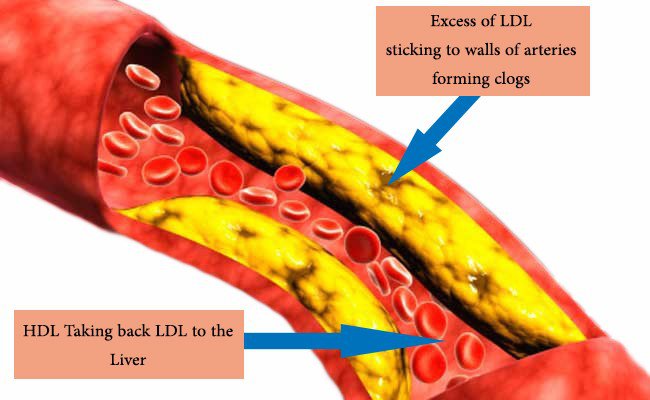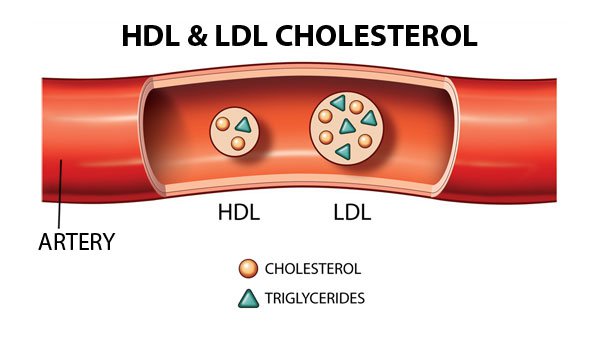Cholesterol has long been an obsession with many people. For the purpose of learning more about cholesterol, distinguish the difference between good cholesterol and bad cholesterol, refer to the article below.
1. What is cholesterol?
Cholesterol is the essential part of fat that cells in our body need. Cholesterol has two sources, one is made from the liver, the other is absorbed from food, and cholesterol is not entirely harmful substances.
Cholesterol is transported in the blood thanks to lipoproteins – transport mediate. Therefore there are two concepts, LDL cholesterol and HDL cholesterol:
- LDL cholesterol (low density lipoprotein cholesterol): low density lipoprotein cholesterol low density
- HDL cholesterol (high density lipoprotein cholesterol): high density lipoprotein cholesterol.
2. What is the difference between HDL cholesterol and LDL cholesterol?
The fundamental difference between HDL cholesterol and LDL cholesterol is: HDL cholesterol is "Good cholesterol", while LDL cholesterol is "Bad cholesterol".
HDL cholesterol accounts for about 1/4-1/3 of the total cholesterol in the blood, which is said to be good because it transports cholesterol from the blood to the liver, transporting cholesterol from atherosclerosis plaques, thus reducing the risk of atherosclerosis and other serious cardiovascular events.
LDL cholesterol is a "bad" component of cholesterol, when LDL cholesterol increases much in the blood leading to deposition in the walls of blood vessels, causing atherosclerosis plaques. Atherosclerosis gradually causes narrowing or embolicosis of blood vessels, leading to life-threatening diseases such as myocardial infarction, stroke,…

3. How much should HDL cholesterol and LDL cholesterol be?
HDL cholesterol is good cholesterol, so the higher the blood level as possible, the optimal value is > 60 mg/dL.
LDL cholesterol is bad cholesterol, should be limited to low levels in the blood, the optimal value is less than 100 mg/dL.
4. What factors affect LDL cholesterol and HDL cholesterol?
LDL cholesterol may increase due to diet-related factors, bad habits such as smoking, sedentning, or associated with conditions such as hypertension, diabetes mellitus…
DECREASED HDL cholesterol can be caused by smoking, being overweight, obese,… Therefore, to increase HDL cholesterol, it is necessary to quit smoking, maintain a reasonable weight, increase physical exercise …

5. Methods to have optimal levels of LDL cholesterol and HDL cholesterol?
To have optimal levels of LDL cholesterol and HDL cholesterol is not easy, it requires perseverance to follow a healthy lifestyle, a healthy diet and a reasonable workout. The sooner you start a healthy life, the better the results. Experts advise:
Food to eat
- Eat a lot of vegetables, fruits.
- Eat cereals.
- Drink non-fat milk.
- Lean meat, skinless poultry meat.
- Fatty fish (high in oil), at least 2 times a week.
- Unsaturation vegetable oil (olive oil, sunflower oil, soybean oil …).
Feed should be limited
- Margargar, animal fat, unfiltered animal meat.
- Fatty milk (whole cream).
- Covered with animal organs.
- Processed food: pate, sausage, salami …
- Fried foods, fast food (including instant noodles).
- Vegetable oils high in saturated fats: coconut oil, palm oil, almond oil …
Reasonable workout mode
- Practice a minimum of 30 minutes a day.
- Practice regularly on days of the week.
- The intensity of exercise is strong enough, sweating enough (if there is a pathology in the person should consult doctors about the specific training regime).
Live healthy, quit harmful habits
- Quit smoking: smoking not only affects the formation of atherosclerosis, but also causes disorders of blood lipids as well as many other adverse effects.
- If drinking alcohol, it is not recommended to drink a lot, avoid alcohol abuse. It is best to drink red wine, which amounts to no more than 142 ml per day.
- Lose weight if overweight/obese, maintain an ideal body mass index (BMI) (BMI from 19 – 23).
- Avoid a sed sedable lifestyle, avoid stress
For direct advice, please click hotline number or register online HERE. In addition, you can register for remote consultation HERE
- Instructions on how to read the results of a blood test
- Signs that you have dyslipidemia
- How reasonable is it to eat chicken eggs?

